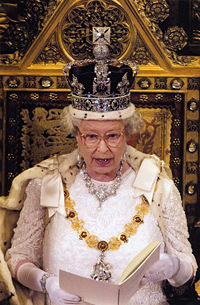Parliament of the United Kingdom
The Parliament of the United Kingdom is responsible for holding the work of the UK government to account. Its members, elected and unelected, discuss and vote on all proposed laws, and allow the government to tax the people. Through parliamentary sovereignty, the parliament is supreme above all other bodies within the UK and its territories. Parliament is bicameral, consisting of two houses, the 'lower' elected Commons and the 'upper' appointed Lords, and is ultimately ceremonially headed by the monarch, Queen Elizabeth II. Members of each house meet at the Palace of Westminster in London, with its clock tower housing Big Ben, the famous bell.

The monarch visits Parliament annually in a ceremony to begin parliamentary proceedings. During this State Opening of Parliament, the Queen's Speech sets out her government's intentions for the coming year.
Of its two Houses, the Commons is more powerful because it is directly elected by the people. Under the Fixed-term Parliaments Act 2011, the lifetime of Parliament is normally five years. By convention, most government ministers are Members of Parliament, though some are drawn from the Lords and membership of Parliament is not required to serve. The Lords can delay, but not block, proposed laws, and has no role in scrutinizing Budget legislation; these bills rest with the Commons and the Chancellor of the Exchequer, the UK's finance minister.
The UK Parliament developed over many centuries, and through the British Empire and the Commonwealth of Nations has become the model for several other parliaments around the world. Its roots are in mediaeval councils, which led to an English Parliament and eventually the establishment of the Parliament of Great Britain in 1707, when England and Wales were united with Scotland into one state. Nowadays, much legislation applied only to Scotland goes through the Scottish Parliament instead, since its creation in 1999.
History
(additional links are available on the timelines subpage)
The United Kingdom Parliament is the product of eight hundred years of evolution
[1] that converted what was once a meeting of monarch's advisers into what is now a sovereign legislature. The transfer of sovereignty from the monarch began in the 13th century with the agreement that is recorded in the Magna Carta, and was largely completed in the 17th century by the outcome of the Glorious Revolution, as codified in the Bill of Rights. Its development as a representative body started in the early 14th century with the regular appointment of representatives of the counties (knights of the shire) and of the towns (burgesses). After 1341 they sat together in one chamber, became known as the House of Commons, and deliberated separately from the King and his nobles.
[2]
A restricted right to vote in elections of Members of Parliament was establised in the 15th century by the Franchise Act, 1429, which conferred that right upon freeholders of land worth more than 40 shillings, and was extended in stages until universal adult suffrage was established by the Representation of the People acts of 1918 and 1928. The relative influence of the House of Lords was simultaneously reduced, and its power to overrule the House of Commons was removed in 1911[3].
The rôle of Parliament - overview
The main rôles of Parliament are examining and challenging the work of the government (scrutiny); debating and passing laws (legislation), and enabling the government to raise taxes, The business of Parliament takes place in two Houses: the House of Commons and the House of Lords. Their work is similar except that the House of Commons alone is responsible for making decisions on financial Bills. The members of the House of Commons are elected representatives of geographically determined parliamentary constituences, whereas the those of the House of Lords are mostly appointed, having been chosen for their experience and expertise. The functions of the Crown (monarchy) in Parliament are essentially ceremonial [4]
House of Commons
The House of Commons shares with the House of Lords the functions of scrutinising the actions of government and examining and approving proposed legislation, and it alone can authorise government expenditure. It has legislative priority in the sense that it cannot be overruled by the House of Lords. The conduct of its business is governed by rules and conventions that usually serve to facilitate the conduct of government, and is carried out by elected Members of Parliament with the support of an administrative staff. Members of Parliament serve in a range of rôles, including "ministers" who are the political managers of government departments, and "shadow ministers" who are their opposition counterparts; the "Leader of the House" and the "whips", who together manage the business of the House; and "backbenchers" to whom none of those duties have been assigned. The chief officer of the House of Commons is "the Speaker", who chairs its debates, enforces its rules and acts as its spokesman. The Speaker also chairs the "House of Commons Commission", which employs its administrative staff and directs its administrative departments.
House of Lords
The House of Lords is the second chamber of the Parliament of the United Kingdom[5]. Its principal functions are to initiate, scrutinise and amend legislation. It has no general power of veto, but it attaches importance to its ability to return proposed legislation to the House of Commons, the lower chamber of Parliament, for further consideration.[6].
References
- ↑ The Evolution of Parliament, www.parliament.uk
- ↑ The Rise of the Commons, www.parliament.uk
- ↑ Except in respect of a House of Commons motion to extend its own life
- ↑ Parliament and Crown, www.parliament.c.uk
- ↑ House of Lords, www.parliament.gov.uk
- ↑ The Work of the House of Lords, House of Lords, 2009.